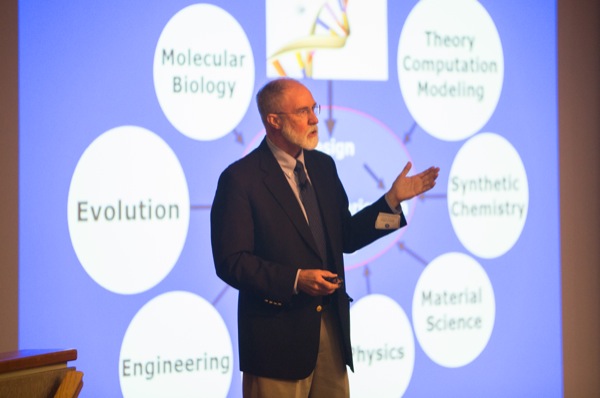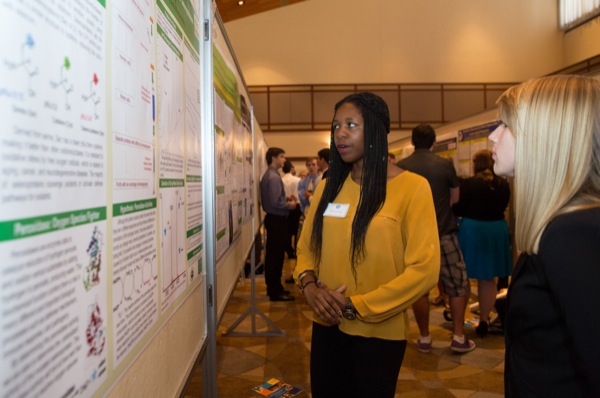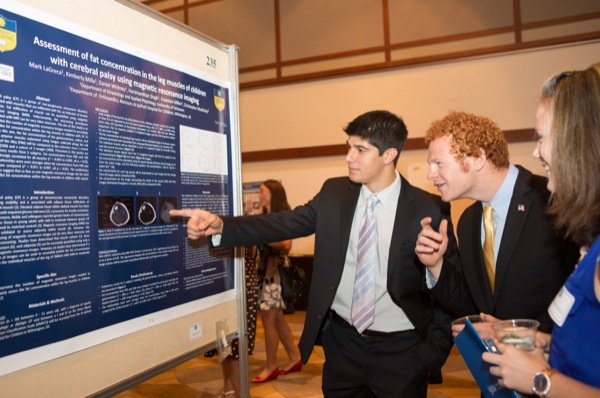


Summer scholars
Symposium highlights undergraduate research, service projects
1:05 p.m., Aug. 22, 2014--Summer student research and service efforts spanning a wide variety of interests took center stage at the fifth annual University of Delaware Undergraduate Research and Service Celebratory Symposium held Thursday, Aug. 14, in Clayton Hall.
More than 350 undergraduate research and service scholars and visiting scholars presented their findings and shared their service experiences through poster displays and oral presentations.
Research Stories
Chronic wounds
Prof. Heck's legacy
James Collins, Virginia M. Ullman Professor of Natural History and the Environment at Arizona State University, was the plenary speaker.
In recognizing the summer scholars and service volunteers for their contributions to academic research, Collins asked students to consider new approaches to thinking about and conducting academic research.
“I want to tell you that biology is undergoing an amazing transformation,” Collins said. “This is affecting what education is all about.”
Collins noted the progress of biology as a specific field of scientific study, beginning in the late 19th century, to synthetic biology in the present century.
“In the last century, we saw life sciences split into the four great pillars of cell biology, genetics, evolution and ecology,” Collins said. “Everyone in this room is made up of cells, everyone has the informational molecules RNA and DNA, and we have the radical idea that all life is connected.”
The connection between these pillars of life sciences began to branch in ways that are now seen as very large complexes of interactions across these four areas as well as with other major areas, Collins said.
“Biology has morphed into what I call the life sciences, and biology is now the study of life that intersects with all kinds of disciplines, including the arts and humanities,” Collins said. “All of them are now pulled into this discussion, as biology begins to impinge on a whole range of issues related to society.”
Collins also noted that students at UD are fortunate to have two institutions specifically created to cross boundaries.
“The Interdisciplinary Science and Engineering Laboratory was built to facilitate this kind of thinking, and you also have the STAR Campus,” Collins said. “This is helping to foster engagement of different sorts of individuals across different kinds of disciplines.”
Historically, this process of discovery has been achieved by single individuals, but is now increasingly done by larger groups of individuals working through social networks.
“You are the leading edge, the tip of the spear, as they put it, when it comes to helping to teach me about social media,” Collins said. “We stand at this intersection of two cultural forces, informal learning that you have gone through and the formalization of this learning process that you are getting at UD.”
Collins closed by challenging students to build on their undergraduate research and service learning opportunities.
“I encourage you young people to think about what you have been doing this summer,” Collins said. “As you go ahead from here, think about how you can take that knowledge, that way of thinking, to inform the future with just a little bit of wisdom and make it that much different as a result of your having been here at the University of Delaware doing this sort of research.”
Student researchers
Avery White, a junior biomedical engineering major mentored by Christopher Price, assistant professor of biomedical engineering, presented her poster on “Identification of Early Through Late-State Changes in Marine Articular Chondrocyte Biology Following Joint Destabilizing Surgery.”
“My topic is about post-traumatic osteoarthritis, one of the most common forms of arthritis,” White said. “After serious joint injury, two members of my family were affected with torn anterior cruciate ligament (ACL). There are no preventive treatments, and the only known treatment is knee replacement and pain treatment.”
White hopes to continue to support the progress she has made in her research over the next two years at UD.
“I was fully able to immerse myself in the research,” White said. “I fell in love with the research and want to go to graduate school.”
Ian Berke, a junior biomedical engineering major, also mentored by Christopher Price, presented a poster representing his research on “En Block Staining and Clearing Techniques for Visualizing Bone and Cartilage Cell Morphology.”
“My interests are all related to biomedical engineering subjects,” Berke said. “The research is about improving imaging techniques. The current techniques have been around for a long time.”
The goal of this process is to allow researchers to obtain a clearer and more in-depth view of various tissue samples, Berke said.
Berke also would like to build on the experience gained by participating in the summer undergraduate research program.
“I definitely enjoyed working with Christopher Price, and would like to finish up with my research while at UD,” Berke said. “It’s cool seeing what everybody else spent their summer working on, on to see what they got out of their efforts.”
Sustainability Prize
The fourth annual Interdisciplinary Undergraduate Research in Sustainability Prize was awarded during the symposium. The winners are as follows:
- First place: Thomas Keane, faculty mentor Joel Rosenthal, assistant professor of chemistry and biochemistry, “Electrocatylized CO2 Conversion at Metal Trifate-Plated Electrodes,” and Chelsea Rozanski, faculty mentor Jon Cox, assistant professor in the Department of Art, “The Ancestral Lands of the Ese’eja – The True People.” Both co-recipients are seniors in the College of Arts and Sciences.
- Third place: Jordan Hochman, an environmental engineering major, faculty mentor Steve Dentel, professor of civil and environmental engineering, “Breathable Membrane Enclosures for Fecal Sludge Stabilization.”
The Sustainability Prize was established by the Undergraduate Research Program, the University of Delaware Library and Gale, a leading organization in e-research and educational publishing, to encourage undergraduate research and projects in the area of sustainability.
The prize is presented in conjunction with the implementation of the Global Reference on the Environment, Energy and Natural Resources (GREENR) database by the University Library.
The Center for Science, Ethics, and Public Policy Essay Competition Award winners are:
- Hayley De Marchis, a senior in the College of Earth, Ocean, and Environment;
- Sharon Dutton, Delaware Technical Community College;
- Brittany Fay, senior, College of Engineering;
- Quincy Hardy, Florida A&M University;
- Rebekah Houser, senior, College of Engineering;
- Michelle Paukett, senior, College of Agriculture and Natural Resources;
- Molly Peters, senior, College of Arts and Sciences;
- Chelsea Rozanski, senior, College of Arts and Sciences;
- Ross Sausa, sophomore, Alfred Lerner College of Business and Economics;
- Kelly Scanlan, senior, College of Education and Human Development; and
- Lindsay Yeager, senior, College of Arts and Sciences.
Phi Kappa Phi Research and Service Essay Awards winners are:
- Erin Lynch, sophomore, College of Arts and Sciences;
- Megan Lyons, senior, College of Arts and Sciences; and
- Shaivi Patel, biological sciences major, College of Arts and Sciences.
The symposium is supported by the Alliance of Summer Scholar Programs, composed of directors, coordinators and representatives of each of the University’s Summer Scholar Programs.
Article by Jerry Rhodes
Photos by Ambre Alexander Payne










